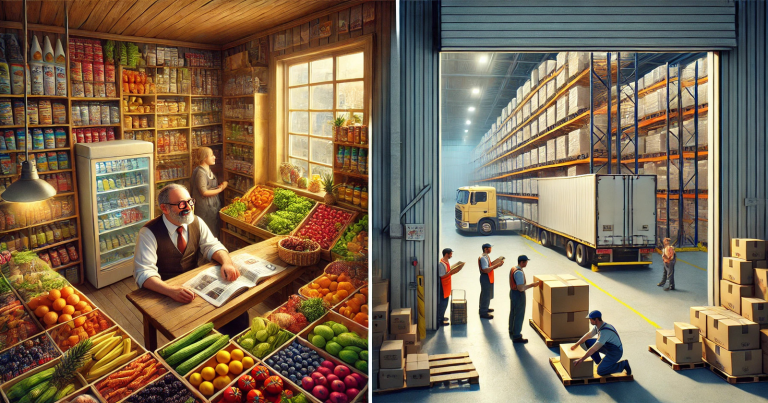The difference between commerce and business is simple but essential. Business is making, buying, or selling goods and services to earn a profit. Commerce is the activity that helps in moving these goods and services from producers to consumers. It includes buying, selling, trading, and transporting goods. In short, business makes the goods, and commerce moves them to the people who need them.
Understanding the difference between commerce and business helps us know how the economy works. Business focuses on creating products and services, while commerce deals with distributing these products and services. Both are important for a country’s growth and development. Without business, there would be nothing to sell. Without commerce, products would not reach customers.
What is Commerce?
Commerce is buying, selling, and exchanging goods and services. It includes all activities that help transfer products from the producer to the consumer. Commerce covers trade, transportation, banking, insurance, advertising, and warehousing. It ensures that goods are available at the right place and time, making life easier for people.
Commerce connects producers and consumers. Producers make products but need help getting them to the customers. This is where commerce steps in. It provides the necessary channels to move products from factories to homes, like stores, online platforms, and delivery services. Commerce makes sure that products are available to people whenever they need them.
Role of Commerce
Commerce plays a big role in the economy. It helps move goods from the place where they are made to the place where they are needed. Without commerce, products would stay in factories and never reach the people who need them.
Commerce also creates jobs. People work in shops, delivery services, banks, and other commerce-related places. It helps businesses grow by reaching more customers. Commerce makes products from one part of the world available in another part. This helps countries trade with each other and grow their economies.
Commerce also helps in setting prices. Many sellers compete to offer the best price when they offer the same product. This competition helps keep prices fair for customers. Commerce also provides information about products through advertising and promotions. This helps customers make better choices.
Types of Commerce
Types of commerce related to different forms of activity and services related to the trade in goods and services. They go beyond merely purchasing and selling activities to embrace those systems supporting such trade as transport, banking, and communication. Commerce has different forms. On the one hand, there are wholesale and retail, which represent old forms. There is, however, an additional modern way- e-commerce. But beyond these, international trade also expands commerce, including imports, exports, and foreign investments across borders. The two, together, create a whole network able to drive economic growth between markets worldwide.
| Type of Commerce | Description | Examples |
| Trade | The exchange of goods and services between buyers and sellers. It can be domestic or international. | Wholesale, Retail, Import-Export |
| E-commerce | Buying and selling goods/services online using digital platforms. | Amazon, eBay, Alibaba |
| Wholesale Trade | Buying large quantities from manufacturers and selling them to retailers or other businesses. | Distributors, Suppliers |
| Retail Trade | Selling goods directly to consumers in small amounts. | Supermarkets, Clothing stores |
| International Commerce | Trade between countries, including imports & exports and foreign investments. | Importing cars from Japan, Exporting textiles to Europe |
| Transportation | The movement of goods from producers to consumers ensures smooth trade flow. | Shipping, Rail, Air Freight |
| Banking and Finance | Providing financial services like credit, loans, and payment facilitation to support trade. | Commercial Banks, Investment Banks |
| Insurance | Protecting businesses against risks like theft, damage, or loss during trade. | Life Insurance, Cargo Insurance |
| Warehousing | Storing goods before they are sold or distributed to consumers. | Cold storage facilities, Distribution centers |
| Communication Services | Facilitating information exchange in trade through postal, telecommunication, or digital services. | Email, Courier Services, Telecommunication Companies |
| Advertising and Marketing | Promoting products and services to attract customers and increase sales. | TV Ads, Social Media Marketing, SEO Agencies |
| Aidsto Trade | Support services that help in the smooth functioning of trade activities. | Packaging, Grading, Standardization |
What is Business?
Business is making, buying, and selling goods and services to earn a profit. Businesses provide products and services that people need and want. Business aims to make money, but it also helps create jobs, improve technology, and support the community.
Businesses can be small, like a local bakery, or significant, like a multinational company. They can offer physical products, like clothes and food, or services, like banking and healthcare. Businesses operate in different industries, such as technology, healthcare, and entertainment.
A business needs resources like money, materials, and labour to operate. It also requires good management and planning to succeed. Businesses take risks because they invest money hoping to earn a profit. Sometimes they grow, and sometimes they don’t.
Role of Business
Business plays a vital role in society. It provides goods and services that people need in their daily lives. Without businesses, there would be no products or services to use.
Business also creates jobs. When companies grow, they hire more people, reducing unemployment. This helps improve the standard of living. Businesses also pay taxes to the government. These taxes help fund public services like schools, hospitals, and roads.
Businesses drive innovation. They develop new products, improve existing ones, and use new technologies. This leads to better products and services for customers. Businesses also support other businesses by buying raw materials and services from them.
Importance of Business
Business is important for many reasons. It provides products and services that people need to live comfortably. It also creates jobs, helping people earn a living. Businesses support communities by sponsoring events, donating to charities, and providing services.
Business drives economic growth. When businesses succeed, they expand, create more jobs, and contribute more taxes. This helps the economy grow. Businesses also promote innovation by developing new products and services. This makes life better for people. Businesses help in the efficient use of resources. They try to produce goods most cost-effectively, reducing waste and saving money. Businesses also create market competition, leading to better quality products at lower prices. Businesses have a social responsibility. They should operate in a way that benefits society and the environment.
Difference Between Commerce and Business
Now that we clearly understand what commerce and business are, let’s explore the difference between commerce and business in more detail. While they are closely related, they serve different purposes. Commerce deals with the activities that help exchange goods and services from producers to consumers. It includes services like transportation, banking, insurance, and advertising. On the other hand, business is about creating goods and services to make a profit.
Commerce is a part of business, but business is much broader. Without commerce, companies would struggle to sell their products. Without business, there would be no products for commerce to distribute. Both work together to keep the economy running smoothly.
| Feature | Commerce | Business |
| Definition | Buying, selling, and exchanging goods and services | Creating, producing, and selling goods and services |
| Primary Focus | Distribution and exchange of goods and services | Production and creation of goods and services |
| Objective | Facilitate smooth movement and availability of goods and services | Earn profit by providing goods and services |
| Activities Involved | Trade, transportation, banking, insurance, advertising, warehousing | Manufacturing, marketing, finance, management, innovation |
| Scope | A subset of business activities | Broader, includes commerce as well as production and management |
| Nature | Service-oriented, focuses on facilitating trade | Profit-oriented, focuses on value creation and wealth generation |
| Example | Retail stores, e-commerce platforms, shipping companies | Manufacturing companies, service providers, software development firms |
| Role in Economy | Enhances the distribution network, ensures goods reach the end consumers | Drives economic growth, creates employment, promotes innovation |
| Risk Involvement | Lower risk as it deals with facilitating trade | Higher risk due to investment in production and market uncertainties |
| Revenue Generation | Through commissions, service fees, and trade margins | Through profits from sales of goods and services |
| Dependency | Depends on the existence of goods and services produced by businesses | Relies on commerce for distribution and reaching the market |
| End Goal | Satisfy the need for smooth trade and market availability | Achieve financial gain and market growth |
Difference Between Commerce and Business FAQs
What is the main difference between commerce and business?
The main difference between commerce and business is that commerce involves activities that help in the exchange and distribution of goods and services, while business focuses on creating and producing goods and services for profit.
What is the difference between e business and e commerce?
E-business includes all online business activities, such as marketing, sales, and customer service. E-commerce refers specifically to the buying and selling of goods and services online.
What is WhatsApp Business?
WhatsApp Business is a free app designed for small businesses to communicate with customers. It offers tools for automating messages, sorting chats, and providing quick responses.
Why is business important for the economy?
Business is important because it creates jobs, drives economic growth, supports innovation, and contributes to public services through taxes.
What are the types of commerce?
The main types of commerce are trade (home and foreign) and aids to trade, which include banking, transportation, insurance, warehousing, advertising, and communication.


